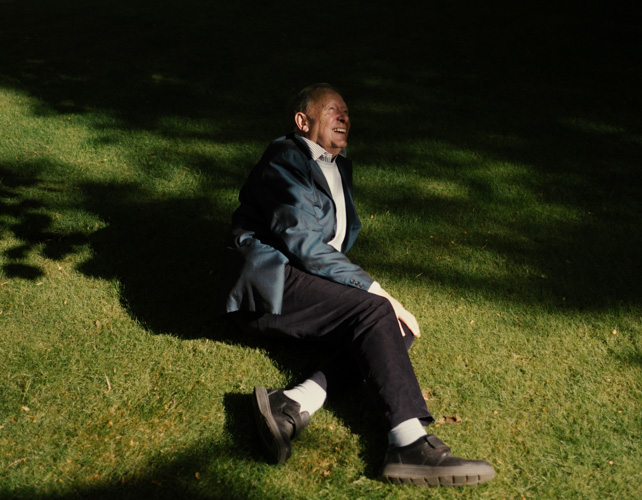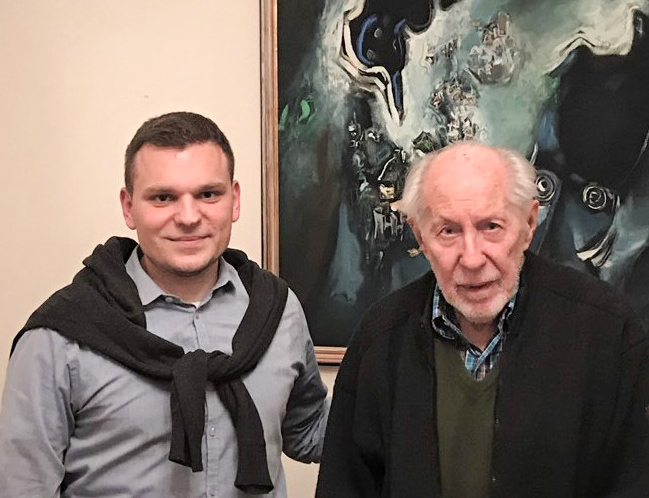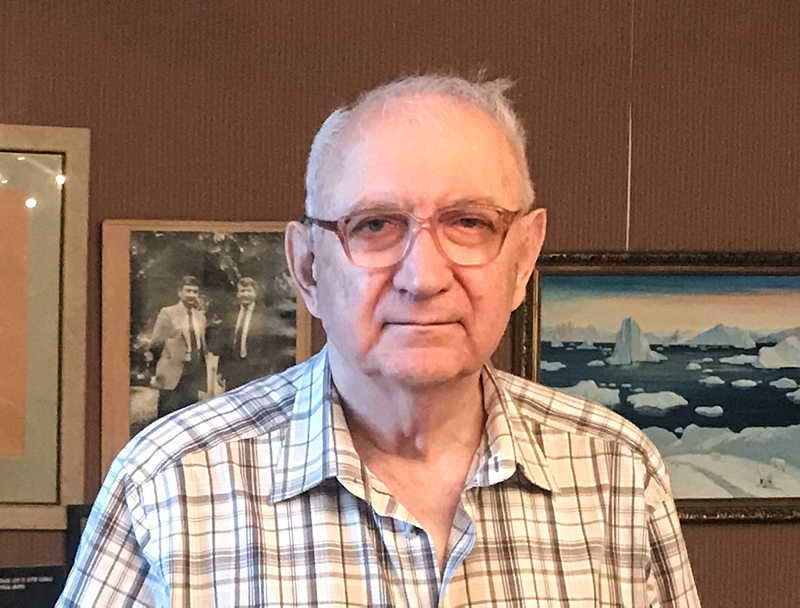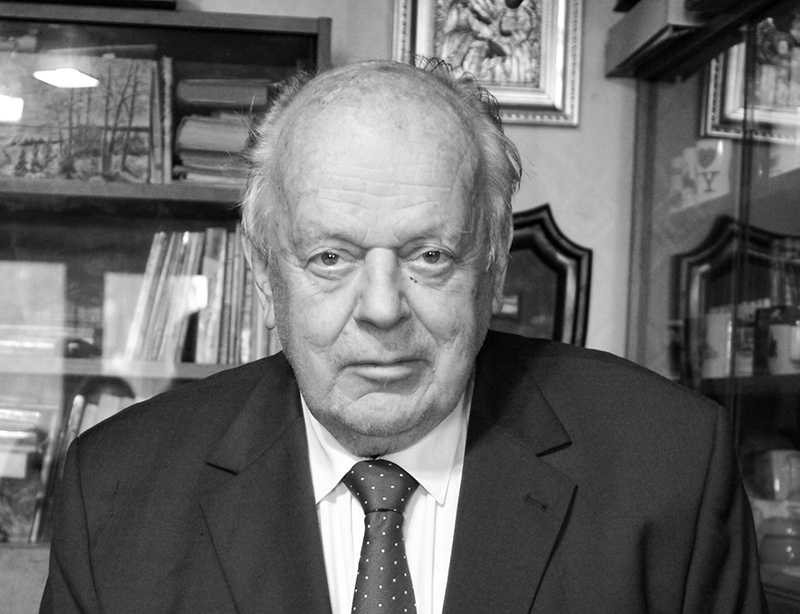Dr Ray Ockenden is an emeritus fellow of Wadham college at the University of Oxford, which he joined in 1967 as its first fellow in German.
Ockenden started to learn German at the age of 13. Following an influential trip to Hamburg, which sowed the seeds for his interest in languages, and curiously for an Englishman, also converted his tea drinking habits, Ockenden first spent a year in Heidelberg and then went on to complete an Oxford undergraduate degree in German and French. Following an exploratory year as a schoolmaster and a year as a graduate student at Balliol College at the University of Oxford, he took up a post as a lecturer in German at Bedford College, London, and after seven years there, joined Wadham College.
He has been teaching German literature and language for the university and for many other Oxford colleges since at Wadham, and has fulfilled several college offices such as Dean, Senior Tutor and Sub-Warden, as well as its Dean of degrees.
Ray Ockenden’s research work, like his tutorial, teaching and lecturing, has been concerned with German literature, especially poetry from 1750 to the present day. He has written about Goethe and also the later poetry of Bertholt Brecht. Most recently he published about the German romantic poet, Eduard Mörike.
Apart from enjoying his love of teaching, of poetry and of European wine, Ray is an active, long-standing member of the Oxford Bach Choir.
In his interview with Annie Hayter he reflects on the British pragmatism that the EU might lose out on in the future, the smell of the metro in Paris, and the curiosity of flying into St. Leningrad but out of St. Petersburg in the early 1990s. His advice for the younger generation: “A tad more listening and a tad less talking.”
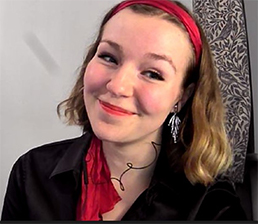
Ockenden was interviewed by Annie Hayter, a writer and poet from London. Hayter is an alumna of the Barbican Young Poets and the London Writers Awards. She won the BBC Proms Young Poet and performed at the Brighton festival, the Southbank Centre, the Barbican and on BBC Radio Three.
Interview Highlights
Political awareness
I forgot to tell you an important story to illustrate that my family wasn’t enormously politically aware, and that is that my father, then aged thirty-six and his younger brother, he was thirty-four, and his youngest brother aged twenty-seven. They decided that they would like to do a walking holiday together on the continent, particularly France. […] And once my father had finished his school teaching term, they set off this walking holiday in August 1939. And when they got to Paris, and went, of course, to visit the famous Louvre Museum, somewhat disconcerted to discover that all the paintings were being taken down and taken away. Because, of course, everybody knew that there was going to be a war and they were taking the paintings to safety. So the three not so young men decided that perhaps they ought to abandon this plan, how they had ever conceived it, I don’t know.
On Brexit
I think one of the obvious tragedies about Britain is that really rather interesting and quite important Englishness, which we can bring to bear on the continental system. I mean, what we are losing, of course, is gigantic and I don’t need to stress that. But the European Union is losing a certain measure, I think, of good old-fashioned sense, common sense and, of course, a feeling of tradition, because we do still have that from the good fortune of having not been invaded since 1066. And we have certain continuities which are loved.[…….] [My hope is that] that we will be part of Europe again and actually being able to contribute what is characteristically English and characteristically British to the European mix, and that the channel continues to be merely 25 miles of water and not anything more serious than that.
On language and cultural exchange
I think you only really understand a country when you speak its language and the fact that English is such a dominant language and that this country is turning into a monoglot country, is, of course, a source of great sadness to me because I know what riches lie in learning other languages, and opening up their cultures. […] I mean, my taste in music, my taste in art, I can’t imagine if I were limited [….] But, you know, if we don’t have access to the art, the architecture, the music, say nothing of the ideas and the philosophy of European countries, then we are very, very impoverished.[…] And I hope, and that’s a different sort of hope, that the massive decline in learning of European languages, which we can see now in schools, is somehow reversed. […] I started teaching at a time when German was suddenly expanding both at schools, but also very much in universities. And I’ve just seen it shrinking and shrinking. And it’s not good for people to suppose that they have the only language that matters. And then the only set of ideas that matter.
On the GDR/Fall of the Berlin wall
I spent a whole summer term at the University of Jena, in the GDR. It happens to be the summer term of 1989. So you might say, what signs did you glimpse of a gigantic change about to overtake Europe? Answer – nil, zero, nothing. (Laughter). A few people were leaking over the front here into Hungary. And some people were protesting a bit about the communist regime. But the idea that the wall was going to fall within a matter of months, absolutely no sign at all. […] And I retained a certain sort of romantic view of what East Germany might have been like if it had been united with West Germany in a more positive way. It was, of course, a takeover by the West. It was an economic takeover particularly, and any ideals that the East might have still believed in got entirely buried and that I regretted.
On freedom
I think I’ve always had enormous amounts of freedom, I suppose. The freedom to say what I felt and thought, to write what I thought and felt, and I don’t think that that’s ever been in question in my life. And I’ve been again, I’ve been very fortunate in that respect. I can’t think of any any situation where I felt that was that was being limited.
On feeling at home
I support the cricket team [in Yorkshire] and it’s about as far as my loyalty to Yorkshire goes. Otherwise I don’t feel I belong. And this is what distinguishes me from all my German friends, is that I don’t feel I belong anywhere. In a way that if you’re German, you absolutely do need to have to want to be somewhere. And I don’t feel I have those roots. I mean, I was born in London. I went back to live in London briefly and then started my academic career, taught at the University of London. I spent seven years there. I don’t feel myself to be a Londoner. And I’ve spent of course, I spent most of my life in Oxford without feeling that this is a place where I have roots, I just have my life. That may have helped this feeling that I could find roots elsewhere in other places.
